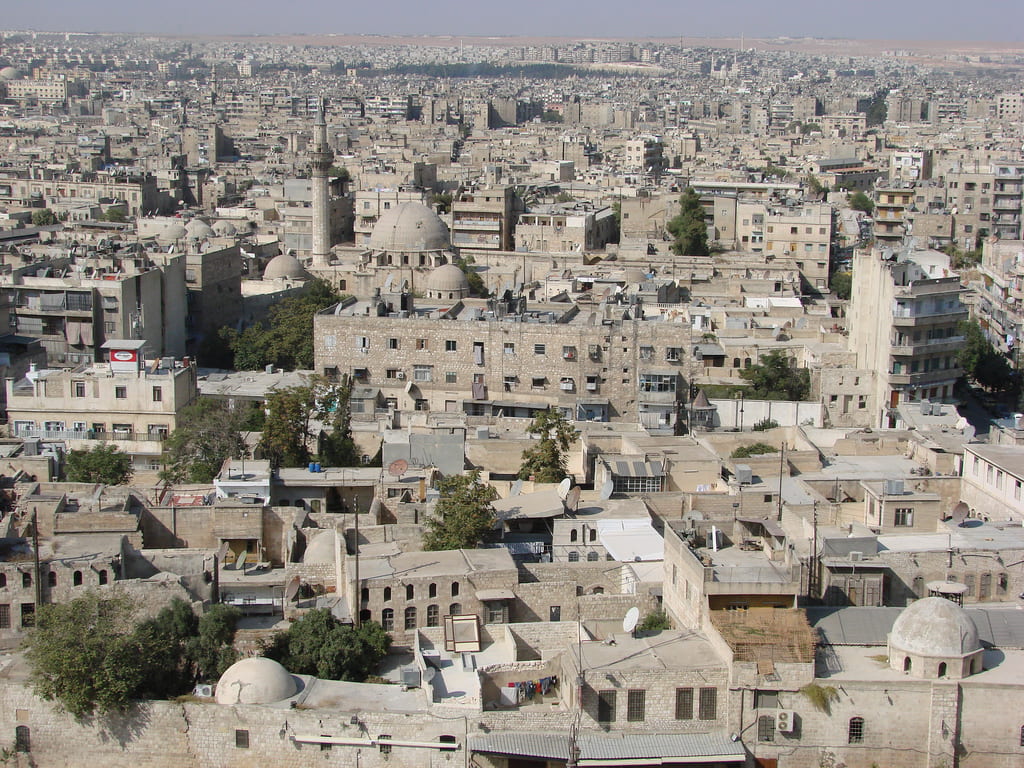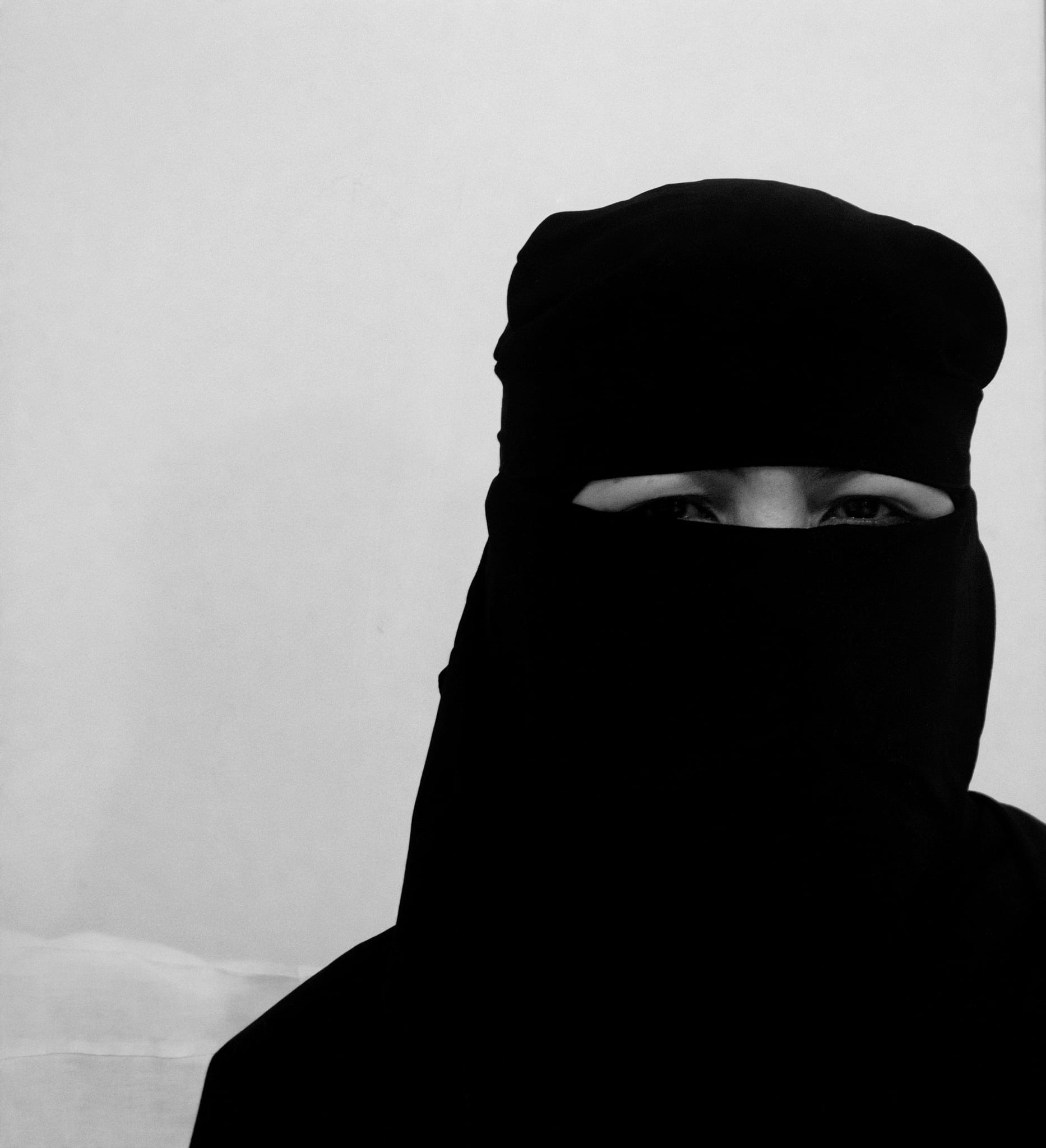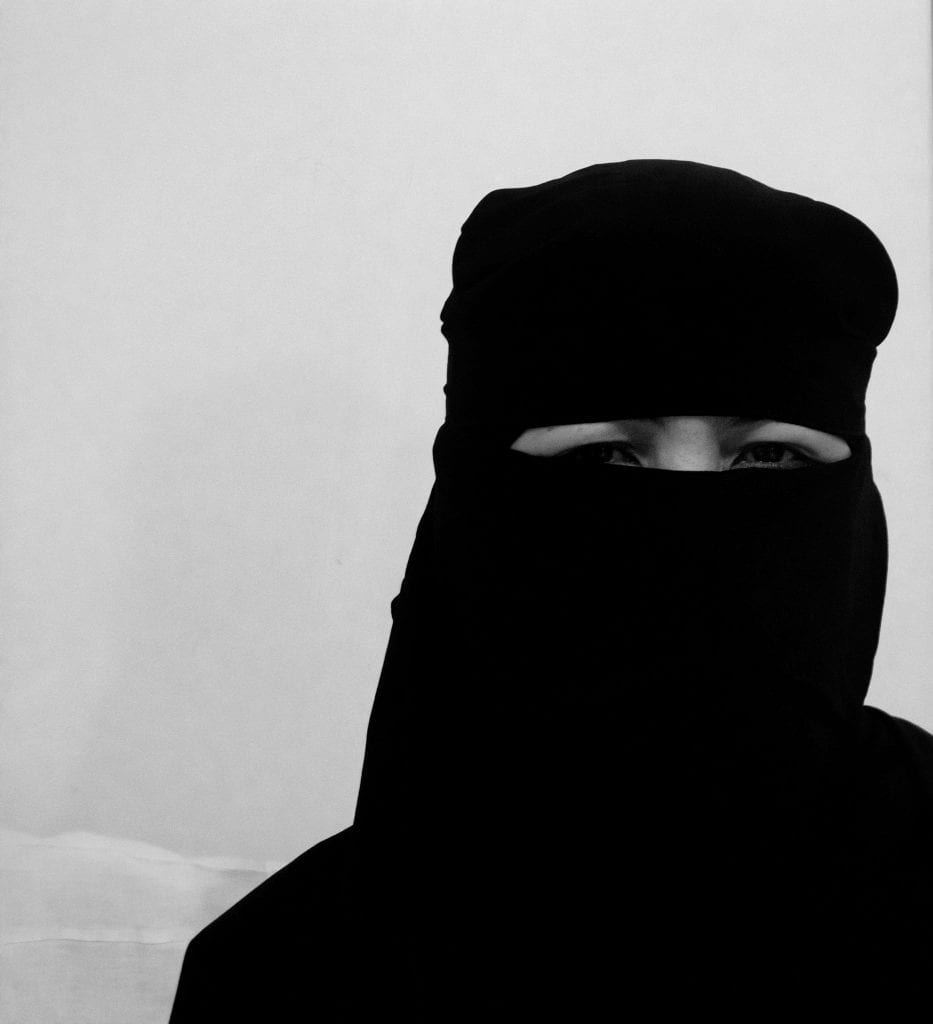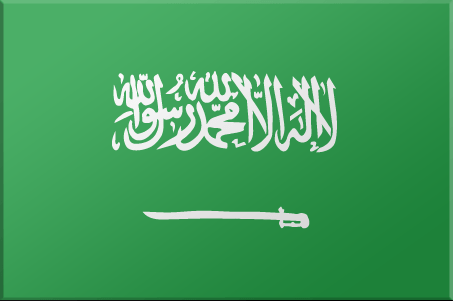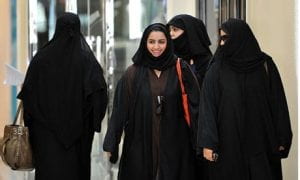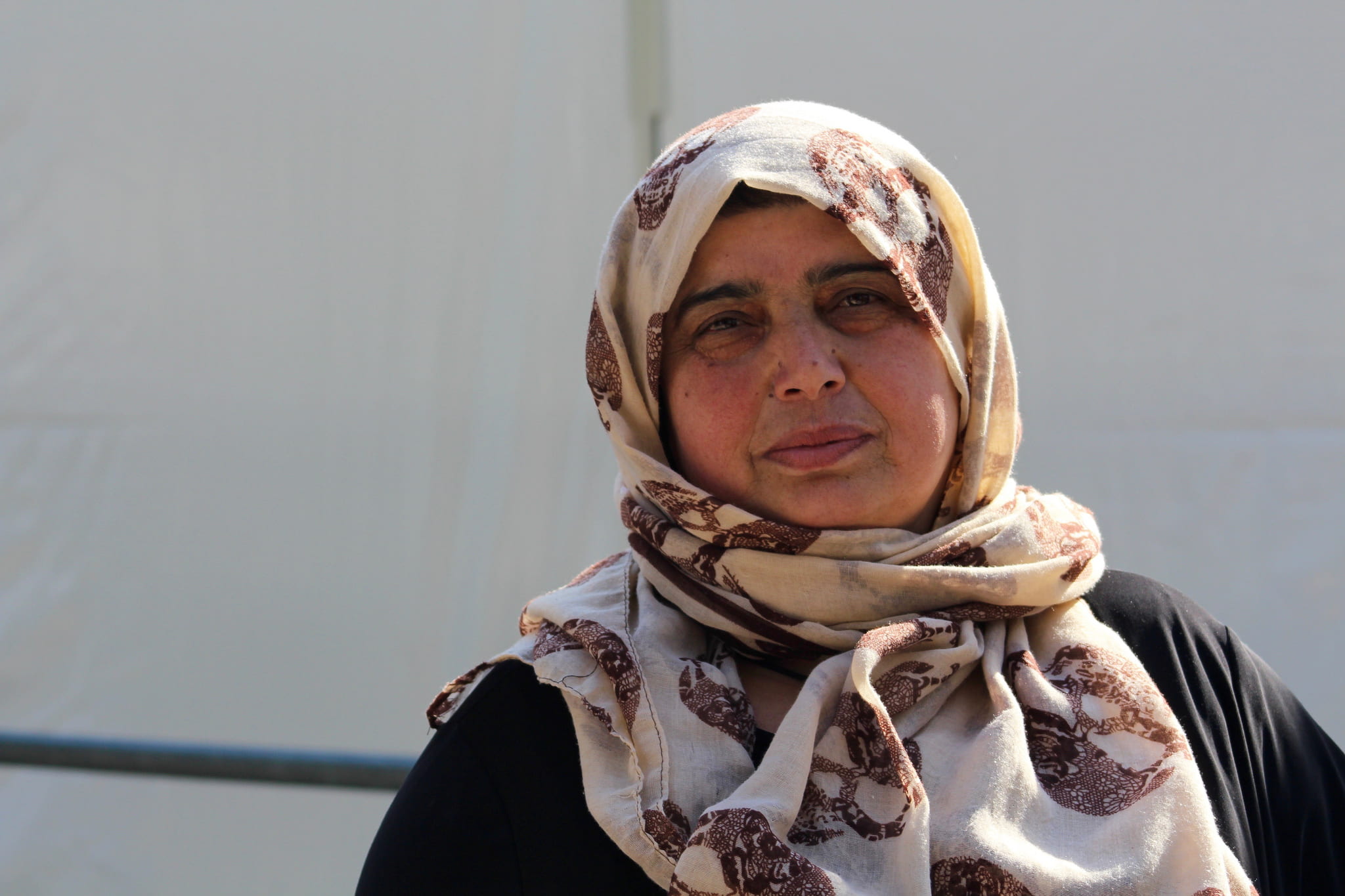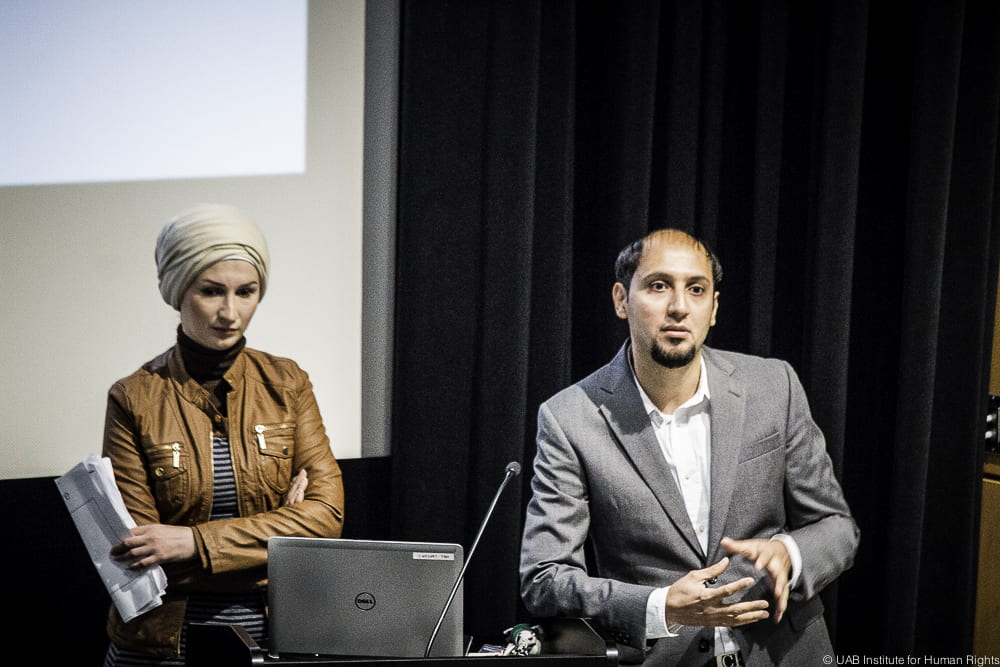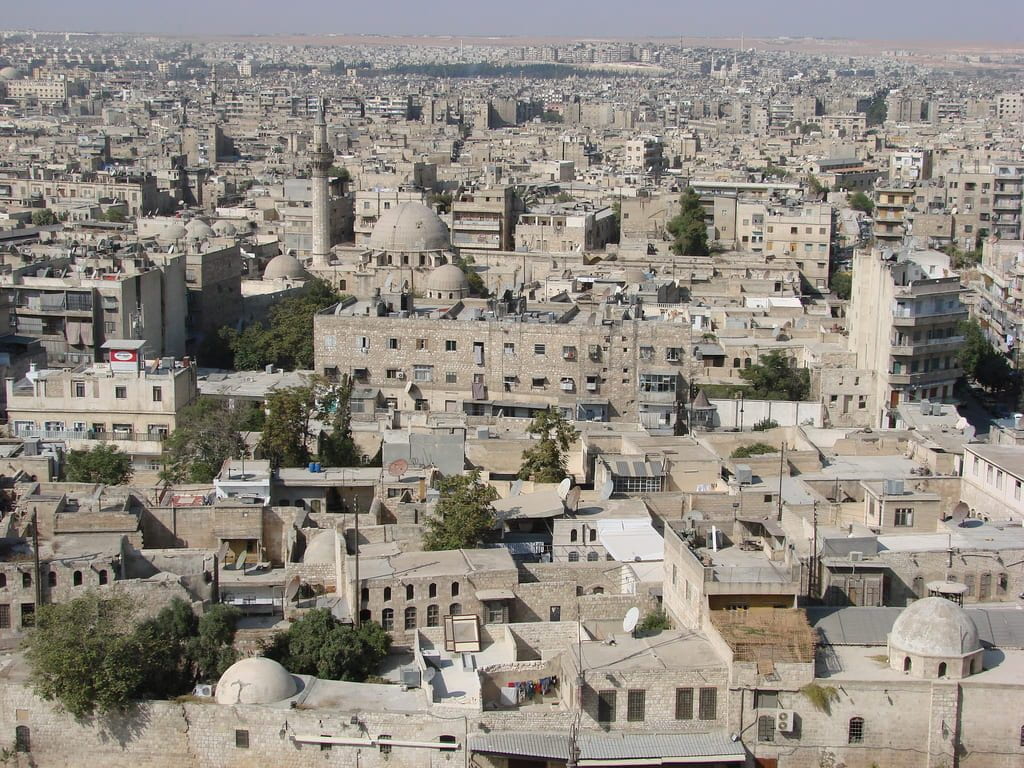
By RUSS HUNTER
I was fortunate to attend a lecture by Dr. John Pace who served in the United Nations for thirty-three years. He distinguished himself as a champion of human rights. He was Secretary to the Commission on Human Rights (1978 to 1994) and Coordinator of the Vienna World Conference on Human Rights (1991 to 1993) with many other posts and special envoys on human rights. I asked Dr. Pace specifically about Aleppo–whether the armed humanitarian intervention (AHI), right to protect (R2P) or the International Criminal Court (ICC) will ever address the glaring human rights abuses by many actors internal and external to Syria. His reply gave me pause. First, he related that AHI as a term is useless. It needs to be debated and defined. AHI is like saying: (paraphrasing) Here is a poisonous sandwich that will nourish you. Second, Syria and in particular Aleppo, will in time be reviewed and the ICC or some other UN commission will tackle the issue. In the meantime, not much will change. I was not surprised by his assessment.
Aleppo, we hear much about the death and destruction, lives forever lost, families forever marred by the violence. Communities wiped out. Horrors that we can barely grasp or fathom as we sit idly by as hundreds of thousands have been displaced. The following will not comfort you, but I do hope it makes you think, make you reflect, make you pause, even if just for a moment about our world politics, and question the reasons why we have allowed something so heinous occur. We have often heard our politicians say things such as ‘never again’, ‘we must not let the human suffering of this magnitude occur’, and ‘don’t cross the red line or we will act’. The reality is, that is all bluster and posturing from politicians. We have just war theory and responsibility to protect as accepted doctrines that can be used to stop an Aleppo from happening. This blog will challenge your thinking in a way that will force you to engage in finding a way to prevent future Aleppo.
We have seen the politics of the UN and in particular the UN Security Council many times before. The failure of the UN has prompted regional coalitions to band together to tackle issues. The UN Security Council is supposed to be the framework for the use of military forces against all forms of aggression. This is particularly the case when forces are piercing the territorial and political sovereignty of a nation. If regional alliances decide to invade on humanitarian reasons but are not sanctioned by the UN, does this destabilize world order? If the politics of the UN fails to protect human rights do regional alliances have a right to intervene? The politics of the UN leads me to my concern: What are the barriers to human rights? What is more likely to succeed in the protection of human rights in a conflict zone?
I will lay out my argument that just war theory (JWT) is justified for humanitarian intervention. The role of the United Nations (UN) Security Council cannot be overstated in this process. My argument lays out how the UN in its political machinations refuses to address the shortcomings of humanitarian intervention (HI). By refusing to address the shortcomings, the UN is a body politic who is complicit in the loss of life and displacement of refugees. Before we go into Aleppo and why it has not ‘triggered’ HI let us first look at intervention, R2P, AHI and HI, and see if we can discern them and come to an understanding of how we can understand them.
R2P is a doctrine that has evolved and used much like JWT to justify military action. It has most of the same elements as JWT: just cause, right authority and right intention, used as a last resort, proportional means, and a reasonable chance at success. The significant difference from JWT is that R2P is for humanitarian reasons or protection of civilians. In other words, JWT seeks political justification for using military force while R2P is not about the political justification but the humanitarian justification. This justification is a fundamental change in the notion of sovereignty. R2P attempts to move from the Westphalian notion of the state being supreme to the R2P claim that an individual’s sovereignty is supreme.
R2P has three distinct responsibilities: responsibility to prevent, responsibility to react and responsibility to rebuild. AHI, HI, and intervention can all be represented in R2P, in essence, R2P evolved from AHI, HI, and intervention. R2P has become part of the UN framework in dealing with a humanitarian crisis. The inclusion is seen by the UN appointing a Special Adviser to focus on the R2P in 2008 and 2009, the release of a report entitled ‘Implementing the Responsibility to Protect.’ R2P is not internationally accepted nor is the basis of intervention (whichever terminology used AHI, HI, or R2P) without controversy. For this commentary, R2P will be synonymous with intervention, HI, and AHI. Is R2P legal? If so, why is it not used more often to secure human rights? If not, how do we legally protect human rights in places like Aleppo?
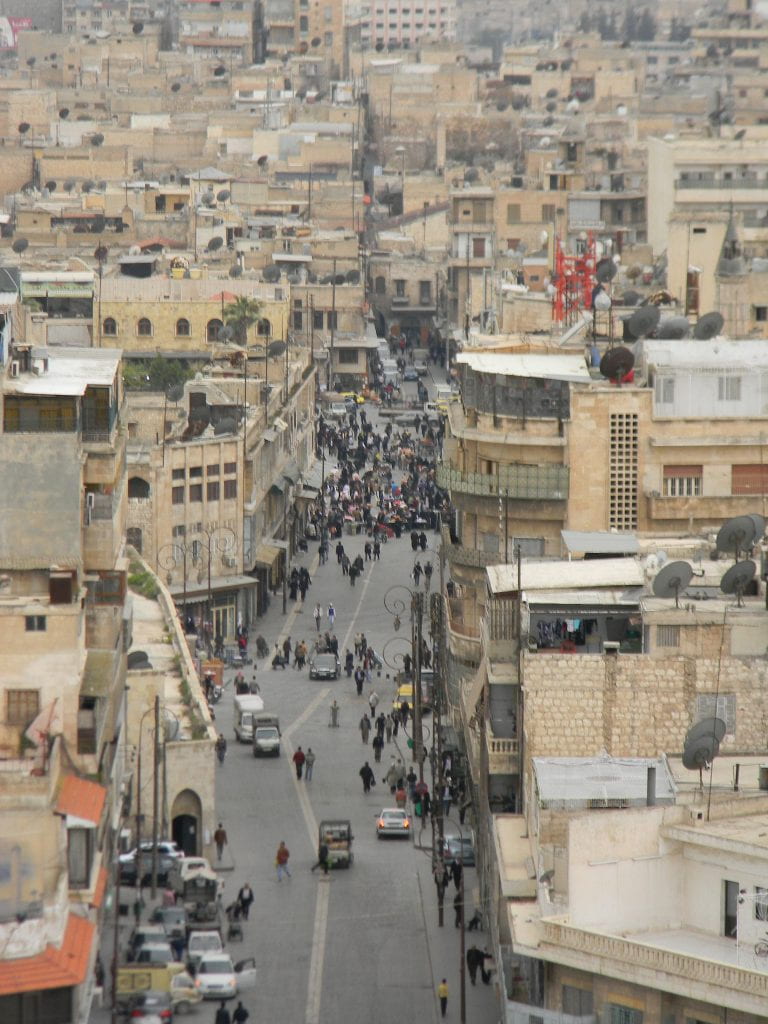
War, armed conflict, police actions, intervention, right to protect (R2P), and armed humanitarian intervention (AHI), all have common threads that run through them that connect them to just war theory (JWT). The 1648 Peace of Westphalia gave rise to the current idea of the nation state and the sacredness of its territory. This concept of sanctity has led the world to accept that international order works best when there is respect for non-intervention in the internal affairs of other states. The atrocities of the Nazi regime in World War II has challenged that Westphalian notion of the nation-state but has not resulted in an accepted form of humanitarian intervention. We are left wondering: Is humanitarian intervention (HI) a right to use force based on JWT or human rights? Walzer, in his legalist paradigm, tells us that the international community has established that the rights of territorial integrity and political sovereignty is above all else. He also says that the political reality must give exceptions, one of which is humanitarian intervention. JWT recognizes that there are extreme cases where HI is needed. We leave this thought for a moment as we look at R2P.
Simon Chesterman, in his book Just War or Just Peace? Humanitarian Intervention and International Law, argues that there is no ‘right’ to use humanitarian intervention in the UN Charter nor customary international law. If this is correct why and how do we use R2P or apply it in future cases, or more importantly apply it to Aleppo? He claims that humanitarian intervention has no legal basis, and yet we have many examples where interventions have taken place. In his analysis, he argues that it is dangerous to have a checklist of additional justifications to engage in humanitarian intervention. By having a list, states are more likely to engage in bad faith interventions (US Iraqi invasion 2003). How do we reconcile the notion of a world based on law if R2P is illegal? He suggests we should view an intervention based on humanitarian reasons as illegal but that the international community may well tolerate it. Let us apply this to Aleppo. If as he says R2P is illegal, but the UN has embraced it, WHY is Aleppo happening? For me, it is political. The UN and specifically the UN Security Council is playing politics. The politics are shaped by the doctrine of R2P and the Westphalian use of JWT. R2P and JWT both agree that HI may be necessary, but there is no agreement on which one may take precedence over the other.
The JWT and R2P conundrum leaves us with what is happening in Aleppo. R2P to date has not been invoked by UN Security Council due to the veto power of Russia and China (and I am unsure if the US, Britain, and France would vote in favor due to strategic interests). The sheer amount of deaths, suffering, and destruction clearly shows HI should have occurred sooner. Why not R2P? Only the UN Security Council can answer that one. From an outsider’s perspective, it is due to political maneuvering and unlike Libya, Syria is not a major oil producer and supplier of oil to the EU like Libya is.
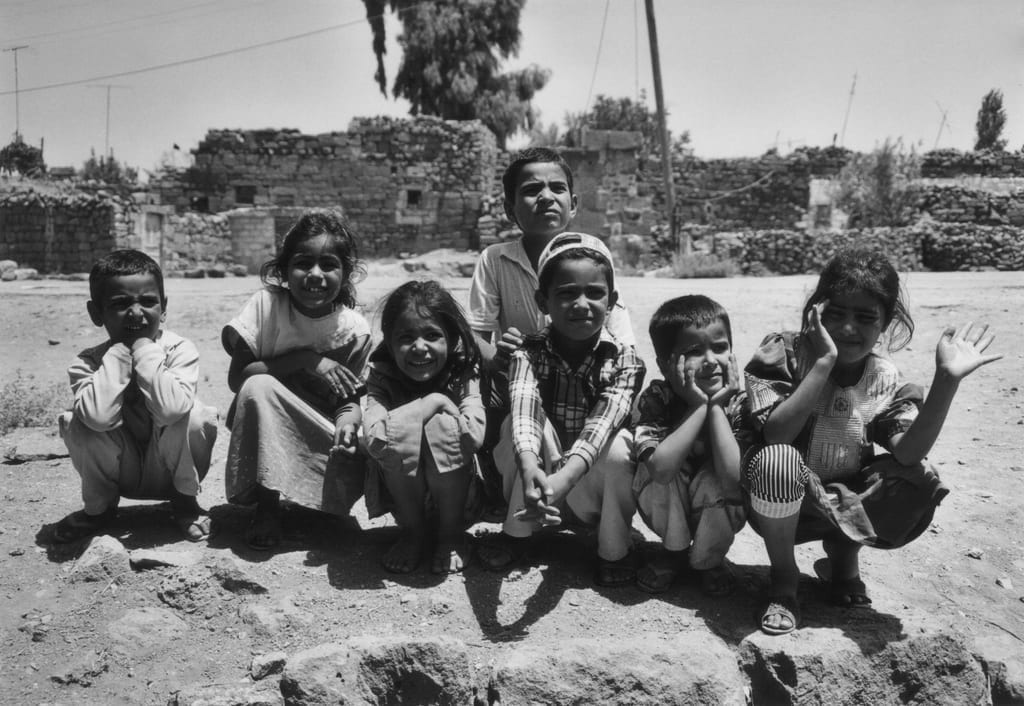
The argument gets sticky here, and some may cringe at what I am about to say. JWT for HI has been invoked – by Assad. Follow me on this. Back to Walzer, his legalist paradigm says the territory and political sovereignty is above all else with exceptions. Within that framework of exception is that the sovereign nation can ask for help with insurrection or anything that threatens to overthrow or pierce their sovereignty. By Assad ‘asking’ Russia for help, they invoked JWT. In doing this, they cut off R2P from occurring. Why? A sovereign nation (Syria) has asked for help (Russia) to defeat an insurgency. Legal and ‘just’ according to JWT. If another country (countries) declared R2P, they do not have a legal basis to intervene, especially without a UN Security Council resolution. If R2P were invoked, it would be declaring war against Syria and Russia. The moment for R2P has fallen to the wastelands of missed opportunities. Why did this happen? R2P has been used recently in Libya, and the aftermath that has ensued in Libya has made everyone pause. For this writer, Libya may have ended R2P from fully realizing its potential. However, why has it failed?
We need to look at the structure of the UN and in particular the sovereignty of the nation-state. We have established under Walzer that the territorial and political sovereignty is above all else. The UN also guarantees this under UN Charter Article 2 (7). As with Walzer the UN Article 2 (7) gives exceptions. This non-intervention can be revoked if the state fails to protect their citizens from repression and internal armed conflicts. Back to my discussion with Dr. Pace. I asked when has the UN ever kicked out a member or declared them minimally unjust? His response “never.” I checked the UN website and could not find any nation expelled or declared minimally unjust. That is where the UN, JWT, and R2P have an issue. If the sanctioning body (UN) and the body that authorizes intervention (UN Security Council) fail to call out leaders of nations who are not minimally just and are not protecting their citizens, how can human rights be upheld? In my opinion, this is the core issue. The UN and the international society have given the state more rights than the individual. R2P tried to change the sovereignty from the state to the individual but as Chesterman points out the law is not on the individual’s side when the nation-state is involved.
Where does this leave us? Is it safe to say that humanitarian intervention is in competing doctrines? Which doctrine is correct? JWT based on national territorial boundaries and political sovereignty or R2P which has no basis in law? If we listen to David Rodin (2002) in War and Self-Defense, he proposes that we should resurrect Kant’s two-tier moral strategy. First, by seeking to mitigate and moderate the evils of war. Second, create a program for achieving a just international system based on an official international rule of law. What Rodin wants is the realization of the ‘cosmopolitan view’ as he pushes for a radical reworking of JWT and international relations.
The basic lesson we should take from the present argument is that our traditional conceptions of international law and international ethics need to be fundamentally rethought. There is a great scope for real and substantial progress to be made in this area. We need a framework of international ethics which gives greater recognition and protection to the rights of individuals as against states, which can address the problems of civil war and internal oppression, and which is able to more effectively restrain international aggression. (Rodin 2002, 199)
Perhaps Rodin has it right. We need to listen and take a lesson from Aleppo. We do need a framework of international ethics, and we have no international body to provide it. The UN is continuing to fail us. The world is suffering. Our human history has never been strong about individual rights. We have had Kings, Queens, Arch-Dukes, Czars, Khans, and Emperors who have ruled empires. We have had conquests to rule the world with no thought of the individual. Human rights are new in the timeline. The Enlightenment ushered in a new awareness of the unalienable rights of the individual, but that has not triumphed over the rights of the state.
History is full of examples of the state trampling on human rights even after the Enlightenment. Mao Zedong, Joseph Stalin, Pol Pot, Kim Il Sung, and many others have killed millions, and yet an individual’s right to life is second to the sovereignty of the nation.

We must face that Aleppo suffers because it is the wrong class, race, and religion of people being harmed. A current list of emergency alerts, published by Genocide Watch, reveals there are no alerts from a global North, or any countries part of BRIC (Brazil, Russia, India, and China) nations; listed are Syria, Sudan, Iraq, Somalia, Central African Republic, Myanmar (Rakhine and Kachin), Burundi, and Boko Haram – Borno State. We have had some regional responses to some of these areas; however, I wager that if this were happening in the global North, we would have seen intervention a long, long time ago.
What will it take to shape the future of human rights? I wager a global North event, an event that rivals that of which we do not like to compare to, I hate to say it but, on the level of the Holocaust. Why? It is because of the failure of the UN to evolve past political manipulation. The League of Nations and the subsequent United Nations was born from the horrific event of the Holocaust. For the UN to evolve once more, I fear it will take something so drastic as to shake the foundations and cause the international society to evaluate itself and what it is doing for humanity.
How can human rights best be protected in a conflict zone? By the UN enacting strong, swift, and a just response to any nation that violates and commits atrocities against humanity. The UN has to act. The UN has to become apolitical when it comes to crimes against humanity. As long as there is a failure of the state to protect the right to life, we must understand that human rights are being pushed backward and not forward. Until the UN becomes able to deal with internal politics, we will continue to have Aleppo’s in our future. So far, the nation-state’s sovereignty reigns supreme, and that does not bode well for the future of humanity.
Russ Hunter Expertise: Civil/Military Operations, Intelligence, WMD Operations
Russ is currently in the Masters in Peace and Conflict Studies program at the University of Otago. He holds a Master Degree in Liberal Arts from the University of Richmond, a Post Grad Certificate from the University of Stirling, Scotland and is a graduate of the U.S Army Sergeants Major Academy. He retired from the U.S. Army as a Sergeant Major in 2009 with over 24 years of distinguished military service in both Operations and Intelligence. He has been a guest lecturer at the University of Richmond. The titles of Russ’ past lectures have been Drone Strikes: A Case for a Moral Response, Evolution of Unmanned Air Systems (Drones in the Sky), and Counterterrorism/Antiterrorism Strategy. He co-taught a Drone law course for law, paralegal and Masters students. Russ has multiple awards and citations both professional and academic.
Works Cited:
Chesterman, S. 2001. Just War or Just Peace? Humanitarian Intervention and International Law. New York: Oxford University Press.
Genocide Watch. 2016. http://www.genocidewatch.com/countries-at-risk
Rodin, D. 2002. War and Self-Defense. New York: Oxford University Press.
Walzer, M. 1977. Just and Unjust Wars. New York: Basic Books.
